Recently I wrote a blog complaining about the lack of focus on the singers in many reviews, and suggested that critics should spend time on whether the singer really brought over the meaning of the words and the emotions of the character. Even when the writer concentrates on the production he or she rarely mentions whether the director has connected his ideas to the opera’s music or words. Often productions ignore what the singers are singing or are so removed from the story that an audience member coming to attend this opera for the first time couldn’t possibly know what the work is about. This can be true even if the language sung is that of the audience.
In America and Europe there are cries from everyone connected with opera that audiences have dropped away, that it is hard to get subscribers, that the money situation is bad. I do not think for a second that the public has suddenly taken a dislike to or disinterest in great singing. Though today’s audiences demand opera as theater, productions that have virtually little or nothing to do with what is being sung are not perceived as a new, fresh look at opera, but a way of stating that the production team has better ideas than the composer and librettist.
Such productions proclaim that the art form is so old fashioned that the only way to make it acceptable is to completely reinvision it. In every audience, certainly in the United States but not infrequently in Europe, some members of the audience are basically unfamiliar with the work and are really lost when the action doesn’t connect to the words. Even those who attend opera frequently complain when the production does not honor the music and the words. From many letters and comments here and in Europe, I know that the audience cares.
Am I opposed to a new look in productions? Not at all. Do I think that productions should always be in period? Not at all (Increasingly the cost of creating period costumes, for one thing, is so completely out of hand that contemporary clothes, already de riguer in Europe, will soon be the same in North America.) I want the words and music to make sense.
Worse, don’t destroy the meaning of the music by what happens onstage. Last season I attended Phelim McDermott’s production of Mozart’s Cosi fan tutte at the English National Opera, a difficult opera to produce at best. Is it a comedy or a serious work? Clearly this ambivalence, as comprehensible today as in 1790 when Mozart and Da Ponte created the work, makes it one of the most fascinating of operas. This production treated the entire opera as a rollicking comedy from the beginning of the overture, so making its many serious moments totally meaningless. What does this accomplish to someone coming to the opera for the first or two hundredth time?
There are many radical productions that make sense. The current La traviata at the Metropolitan Opera by Willy Decker is a good example of one that has nothing to do with the stage picture Verdi and Piave conceived but conveys the spirit of the libretto with complete clarity. Some years ago his Falstaff in Amsterdam set in the train station in Windsor proved totally delightful. It might have been stretching the point to have a huge tree trunk lying across the bar in the train restaurant in the last scene, but he made it make sense.
In Pierre Audi’s production of Tosca at the Paris Opera last fall there were many interesting ideas, the most novel of which was not placing the final act on the roof of the Castel Sant’Angelo. No standard composer is more of a director than Puccini, and consequently it’s harder to make sensible changes in the action to which he has set specific music. The final act, however, tied as it was to what had happened in the first two acts and amazing in its power, carried out the plot and the music stunningly. Set on a stony, desert like place, the actions followed the standard action up until Cavaradossi was shot. A huge wooden cross, which had been suspended over Scarpia’s apartment was in the same place over the stage. As Spoleta rushed to apprehend Tosca, she walked down stage center, directly under the cross, a veil fell over her, and enveloped in the veil and invisible she slowly turned around and walked toward an ever-brighter light at the rear of the stage, continuing until the curtain fell.
No director has included more what seems to me to be unnecessary pornography in his productions than Calixto Bieito, but his ideas for The Dialogues of the Carmelites at Berlin’s Komische Oper and Carmen, originally at the Liceu in Barcelona and coming to San Francisco next summer, were both fresh and to me brilliant readings.
Another completely novel approach was created by Georg Quander for the Deutsche Oper Berlin when he took on the five-hour Robert le Diable of Meyerbeer. This opera, rarely performed anywhere since 1900, challenged a director to revivify a work that has not had what it takes to remain in repertory. Quander obviously bought Wagner’s
famous putdown of Meyerbeer (“effects without causes”), and he must have visualized Meyerbeer as the P.T. Barnum of the Second Empire. In his production a surprising, unexpected effect happened onstage every few minutes; the music served as background to what was happening onstage. The audience in Berlin was captivated at the circus atmosphere, exactly what Wagner and Berlioz hated. But if one is going to spend the money to do one of these operas, this was the way to do it. The five hours passed in a flash.
Finally Vera Nemirova created a Ring for the Frankfurt Opera that had many virtues. It told the story, and with the high level of performance of that house from both its singers and its orchestra made for a great experience. In Siegfried she had an idea, new to me at least, that took away one of the Ring‘s problems. In Siegfried, the hero is supposed to learn fear from seeing his first woman, Brünnhilde. In many modern productions a beautiful, young lyric coloratura dances onstage as the Forest Bird. This always bothers me, because she is clearly a woman. I know one is supposed to believe she is invisible but she’s not. Ms. Nemirova made the Bird a male dancer. I realized what I had never thought of: male birds sing with a high voice as well as females. This made the story work.
Examples of what I don’t like can be easily enumerated. Making the Waterman in Rusalka a rapist and the guests in Act II strange carnivores with blood dripping from the raw meat they devour as happened in Martin Kusej’s Munich production of Dvorak’s opera has nothing to do with the words sung and even less with the music. Roland Schwab’s making Don Giovanni into a totally bleak and black drama with absolutely no light moments and the Don a despicable monster as happened at the Deutsche Oper Berlin like the completely comic Cosi described above ignores the opera’s essential ambiguity , a major part of Mozart’s and Da Ponte’s genius .
Of all the productions of this sort that upset me, none surpasses Günther Krämer’s production of Die tote Stadt at the Cologne Opera. This happened fifteen years ago, and I still remember my frustration. I had attended the opera at the City Opera years before and nowhere else. Foolishly, I believed that I knew the libretto and went without refreshing my recollection. Even though I remembered the vague outline of the story, what happened onstage lost me completely, and at that time I couldn’t make sense out of the German titles. In the intermission for once I could find no one I knew, and the second act was even weirder. All I remember is that the baritone’s famous aria took place behind a scrim with the chorus riding bicycles around him while holding flaming torches. I swore that as soon as I returned to Seattle I would read the libretto. The night after I arrived, I read it, and nothing I read made me understand anything I had seen. That to me is exactly what I am deploring.
The musical theater is and should be a place of experimentation and new thought, but when directors and designers create productions in which the audience either cannot figure out the plot or spends a lot of time trying to understand why some visual or dramatic action happened, opera is not well served. And, worse, the music and singing become less significant than the way the director and designer have created their story.

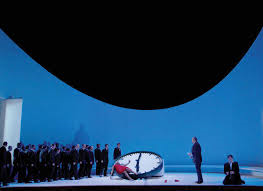
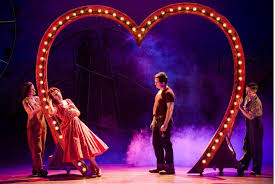
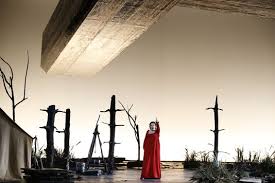
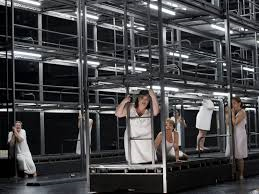
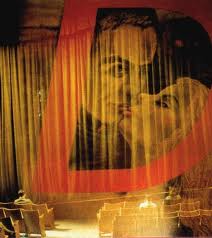
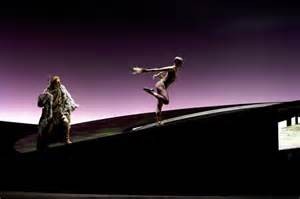
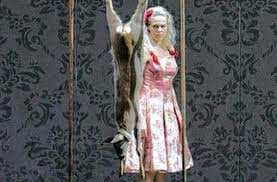
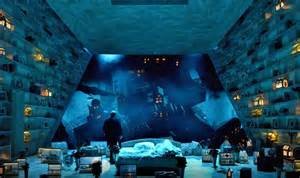
Speight — You mentioned Paris Opera’s Tosca with a dramatically different Act 3. My most memorable Tosca was at Frankfurt Opera in 2011. The final scene was the rooftop of Castel Sant’Angelo as usual. But when Tosca realizes Cavaradossi is dead, she doesn’t throw herself off the parapet. She simply stands, stunned, as the curtain falls. it is less melodramatic, more believable, and far more effective theater. At least to my way of thinking.
There was also a remarkable piece of stagecraft in Act 1. Instead of the traditional canvas on an easel where Caavaradossi paints the portrait, he paints on a wall that fills the entire stage. He gestures with his hands and lights fill in the portrait. Then, with the portrait finished, the entire wall, which is hinged at the bottom, falls to the rear. Flat on the floor. This takes maybe three seconds. And there is Tosca, alone, standing under a huge cross made of black barbed wire. A jaw-dropping scene. Unforgettable. Andreas Kriegunburg was the director. Kirill Petrenko conducted. Erika Sunnegårdh sung Tosca.
I completely agree. The continuous desire from some directors to show off leads to unbearable productions. They way too often forget that they are there to serve the music and the text, not the other way around.
Massimiliano Zanetti’s travesty of a Don Carlo at the Staatsoper Berlin was dreadful on so many levels, it could be a how-to of how to foul up an opera. Just one scene illustrates dome of the horror: Eboli gets humped on a dining room table by Filippo DURING the cello solo before “Ella giammai m’amo.”